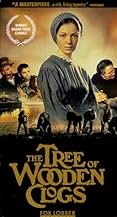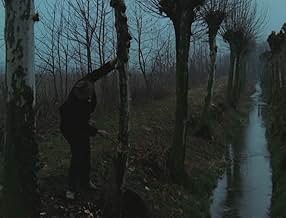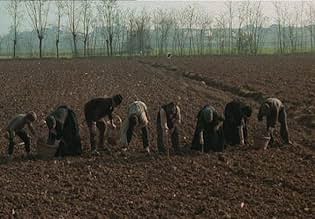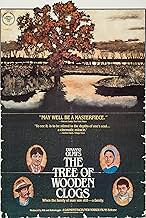- Won 1 BAFTA Award
- 18 wins & 1 nomination total
- Director
- Writer
- All cast & crew
- Production, box office & more at IMDbPro
Featured reviews
10anna-k-2
Yes, it lasts three hours. Yes, it is about a village community where nothing much happens. Not your typical man save-woman blow-up joint scenario, definitely. All this is said on the package, therefore I truly do not understand people who criticise this film for slowness. OF COURSE it is going to be slow, what do you expect? After this private note, some review. The film is excellent and highly recommendable for many reasons. First of all, the shooting: the use of non-professional actors,authentic settings and a real-life focus makes this film feel like a documentary, although it is set over a hundred years in the past. It therefore gives an unprecedented opportunity to peek into the life of rural Lombardy at the turn of the centuries. Secondly, the plot. Slow as it is, it sucks you in nonetheless, as you get emotionally involved with the beautifully depicted community of families. Full of small and big dramas, the film does not cease to surprise till the very end. Finally, perhaps the biggest asset of the movie is the loving, but realistic depiction of the times. There is dirt, hard work and cow dung, but there is also nature, family, and most importantly - love. If you speak some Italian, the additional perk is the beautiful dialect. Highly, highly recommend!
I have a bit of warning for the tender-hearted. This is a realistic portrait of peasant life and as such you'll see a couple animals butchered on-screen. A pig and goose are killed and some might find this pretty disturbing...but it is realistic and is an important part of peasant life.
This film is sort of a more modern Neo-realist sort of film because like the Neo-realist films of the 1940s and early 1950s, it is an Italian film that consists of non-professional actors in natural settings. However, the reason why this was done is quite different. During the time of WWII and post-war Italy, sets and actors were hard to come by and directors (such as De Sica and Rossellini) had no choice but to make these sorts of films. However, in 1978 the film was made this way for entirely different reasons--to heighten the sense of realism as the film was about simple folks and having professionals playing these roles might have detracted from this realism.
The film is set on a farming collective owned by a landlord. Five families work the land and share a large compound broken down into separate apartments and stables. The life is pretty simple and rather grim and the film does a very good job of portraying this life. And this is much of the problem with this film for the average viewer. While history teachers like me might find it all pretty fascinating and like how accurately this is all portrayed, will the average viewer? Probably not. That's because not all that actually happens in the film---and it lasts about three hours. As a result, the film does drag and I even found myself feeling sleepy as I watched. It's exceptionally well crafted but also a bit of a chore to view.
"Tree of Wooden Clogs" is a film that film critics will adore but the average person will probably hate...and many folks will feel guilty because they didn't 'get' the movie and think they should have.
This film is sort of a more modern Neo-realist sort of film because like the Neo-realist films of the 1940s and early 1950s, it is an Italian film that consists of non-professional actors in natural settings. However, the reason why this was done is quite different. During the time of WWII and post-war Italy, sets and actors were hard to come by and directors (such as De Sica and Rossellini) had no choice but to make these sorts of films. However, in 1978 the film was made this way for entirely different reasons--to heighten the sense of realism as the film was about simple folks and having professionals playing these roles might have detracted from this realism.
The film is set on a farming collective owned by a landlord. Five families work the land and share a large compound broken down into separate apartments and stables. The life is pretty simple and rather grim and the film does a very good job of portraying this life. And this is much of the problem with this film for the average viewer. While history teachers like me might find it all pretty fascinating and like how accurately this is all portrayed, will the average viewer? Probably not. That's because not all that actually happens in the film---and it lasts about three hours. As a result, the film does drag and I even found myself feeling sleepy as I watched. It's exceptionally well crafted but also a bit of a chore to view.
"Tree of Wooden Clogs" is a film that film critics will adore but the average person will probably hate...and many folks will feel guilty because they didn't 'get' the movie and think they should have.
This is a really beautiful film. I am neither Italian, nor Catholic (nor even religious at all in the usual sense) but found this to be wonderful and involving. (I know Italy, and love it, though.) Taking place in around the turn of the previous century, the simple life of farming tenants on a lord's estate is portrayed with great charm and simple respect. You get a fascinating look at what to us now of course seems a backward combination of ancient religious myths and medieval magic, all believed in the hope of a better life in what is a difficult existence. Yet there is a hint of the modern world to come in the distant shouts and arrests of political activists glimpsed to the side, who are advocating a more fair economy, and less dependence on outmoded beliefs. The warm and dignified life of the loving families is quite believable, and no need to judge the comforts they cling to. In terms of length an pacing, it takes its time, it is true, but it is really worth it. A sort of living demonstration of the enduring human spirit, and the passing of time and history---even as old ways are dimly remembered and treasured for their sentiment.
If there were any reason for dropping out of normal life and dedicating oneself entirely to watching Italian films, this might be it! The majestic simplicity and dignity of this film make even the best contemporary films seem trivial and stillborn by comparison. Loved by sensitive audiences and critics alike, Ermanno Olmi's movie describes incidents in the lives of four families sharecropping in Lombardy at the coming of the twentieth century. Olmi's extraordinary command of imagery, movement, rhythm, and lighting conveys a potent nostalgia for Earth and the family of man. There is a scene in which images of a father carving clogs for his shoeless boy are intercut with the lives of the farm families. The music accompanying that scene is a Bach organ chorale. The effect is almost sacramental and entirely overwhelming and may be one of my favorite scenes in all cinema. That scene alone is worth more than all the digitalized special effects, car crashes, ocean liner sinkings, and the deafening Dolby vapidity of so much of the inane junk embraced undiscriminatingly by so many. If they only had the eyes to see, ears to hear, and the soul to love this wondrous work of art.
The most authentic version on this film has the original Bergamasco dialect track. The newer DVDs from Italy have the option of choosing this soundtrack.
The most authentic version on this film has the original Bergamasco dialect track. The newer DVDs from Italy have the option of choosing this soundtrack.
10Rigor
This film really surprises. It is long and detailed, yet, it is amazingly suspenseful. The quiet sturdy look at rural life in Italy manages to accomplish the amazing feet of truly "being" a film of "the oppressed" rather than a mere analysis of "the wretched of the earth". Olmi's direction of the non-professional cast is superb and the film is beautifully shot and edited.
Don't be afraid of this film. It does not actually seem long, nor does it seem aimless or plotless. While one may say that "the whole pesant community" is the real protagonist there are clearly defined characters in the film whose narratives we follow. In fact, the films strategy is one of integration of these narrative strands in a seemingly coherent and logical way. A wonderful, very emotionally moving experience with a clear, sharp, political analysis.
Don't be afraid of this film. It does not actually seem long, nor does it seem aimless or plotless. While one may say that "the whole pesant community" is the real protagonist there are clearly defined characters in the film whose narratives we follow. In fact, the films strategy is one of integration of these narrative strands in a seemingly coherent and logical way. A wonderful, very emotionally moving experience with a clear, sharp, political analysis.
Did you know
- TriviaAll the actors were real peasants from the Bergamo province, in Italy. They had no acting experience at all.
- GoofsWhen the children are making music with pots and pans, the 'instruments' of the little girl are switching from one hand to the other when the camera looks at her from the other side.
- Quotes
[first lines]
Don Carlo: That boy should be going to school.
Batistì: Yes but six kilometers to school and six kilometers back seems a lot.
Don Carlo: He's young, he has strong legs.
Batistì: Just when we're about to have another baby. He could have started helping me around the house.
Don Carlo: He'll help you even more when he's older. Let providence provide for now.
Batistì: I grew up without ever seeing the inside of a school.
Don Carlo: That's not a good reason, and you know it. If God has given your boy a good mind, it's a sign he's expecting more of him. As the boy's father, it's your duty to do God's bidding.
- Crazy creditsQuite strangely, the names of the actors are listed as "last name first name", while the names of the rest of the crew are correctly listed as "first name last name".
- Alternate versionsThere are two versions of this movie: one which is spoken in the dialect of Bergamo, Italy, and one in which the actors dubbed themselves in Italian.
- ConnectionsEdited into Bellissimo: Immagini del cinema italiano (1985)
- SoundtracksIch steh' mit einem Fuß im Grabe BWV, 156
Composed by Johann Sebastian Bach
Performed by Fernando Germani
- How long is The Tree of Wooden Clogs?Powered by Alexa
Details
Box office
- Gross worldwide
- $9,367
- Runtime
- 3h 6m(186 min)
- Sound mix
- Aspect ratio
- 1.33 : 1
Contribute to this page
Suggest an edit or add missing content






















